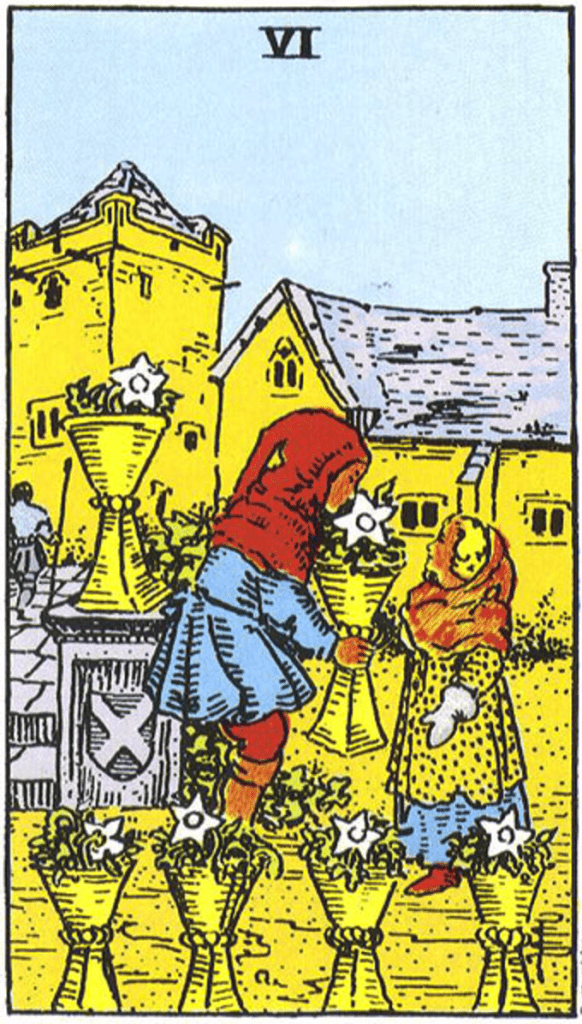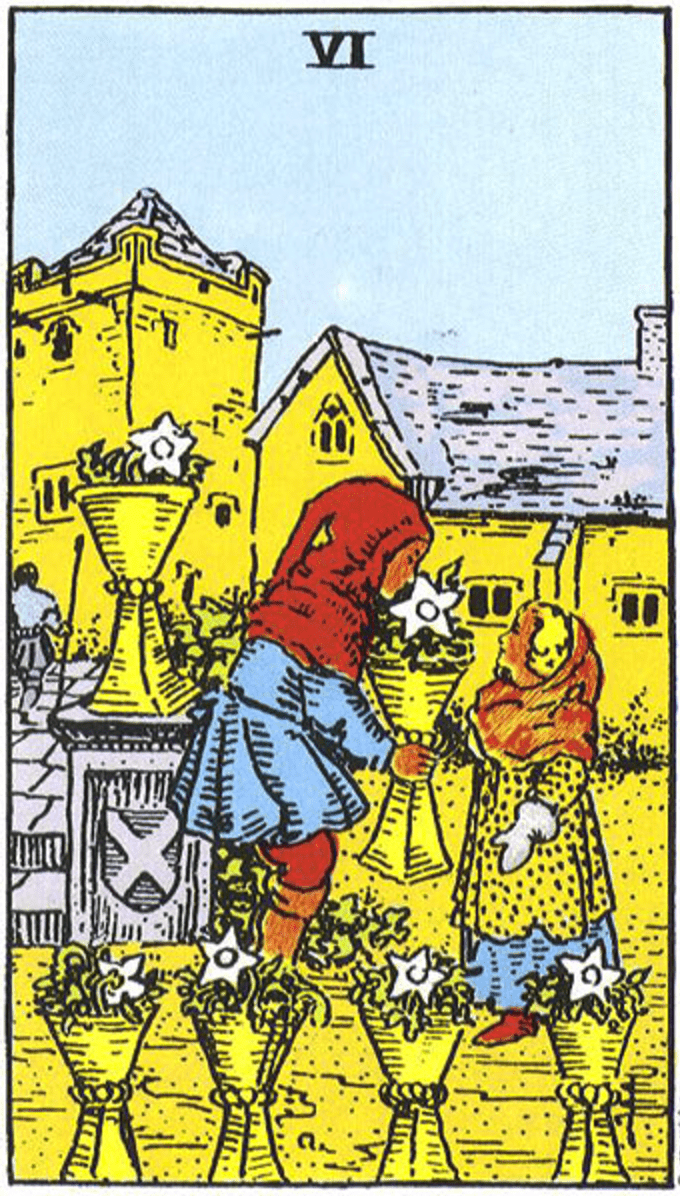
The Six of Cups is the card of childhood, nostalgia, comfort, and familiarity. The card shows a young boy leaning down and passing a cup filled with flowers to a young girl. The girl is happy and grateful, looking back to the boy with love. This shows the passing of traditions, happy reunions, and childhood innocence.
The Six of Cups reminds us that our inner child is important in a meaningful relationship. When we are with someone who we truly love and trust, our inner child will feel free to roam and play. Listen to your innermost self, as your young self is deeply in touch with your intuition. Your child self is young, but they are also wise.
Upright Meaning:
If the Six of Cups appears in a Tarot spread as a person, that means that this person is nostalgic, cherishing memories, and often embodies a sense of innocence or childlike joy. They tend to look back fondly on their past, drawing comfort and happiness from their memories. The Six of Cups person is often seen as someone who brings a sense of warmth and simplicity reminiscent of childhood.
For physical characteristics, the Six of Cups as a person represents someone who has a youthful appearance, often with an aura of innocence and a warm, inviting smile. Their demeanor might exude a sense of playfulness and openness, reminiscent of a more carefree time. This person’s appearance often reflects their inner world, marked by a gentleness and a sense of nostalgia that is visible in their expressions and mannerisms.
For emotional characteristics, the Six of Cups as a person represents someone who is sentimental, kind-hearted, and often has a deep connection to their past and childhood memories. They possess an emotional depth that is rooted in their experiences and memories, often displaying a tenderness and empathy that comes from a place of genuine affection and reminiscence. This individual’s emotional demeanor is characterized by a longing for the simplicity and purity of the past, and they often find joy and comfort in reliving old memories.
Astrologically, the Six of Cups as a person represents someone who is likely influenced by Cancer, signifying a strong connection to the past, family, and home. Their Cancerian traits may include a deep sense of loyalty and protectiveness towards loved ones, as well as a tendency to be emotionally driven by their connections to people and places from their past. This astrological influence can also endow them with a nurturing and caring nature, often directed towards those they consider part of their ‘inner circle.’
For careers, the Six of Cups can represent someone who works in a field related to children, history, or any profession that involves recalling or preserving the past. They may find fulfillment in roles that allow them to connect with history, heritage, or the nurturing of younger generations. The Six of Cups person’s career is often influenced by their fondness for the past and their desire to maintain a connection to it, whether through teaching, preservation, or storytelling.
The Six of Cups as a person represents someone who makes you feel nostalgic and reminds you of the simplicity and purity of past experiences and relationships. Their presence can evoke a sense of longing for days gone by and encourage a reconnection with one’s own history and roots. This person’s influence serves as a gentle reminder of the importance of cherishing memories and the joy that can be found in reflecting on the happy moments of one’s life.
Reversed Meaning:
If the Six of Cups reversed appears in a Tarot spread as a person, that means that this person is stuck in the past, unable to move forward, or clinging to outdated memories. This reversal suggests a challenge in letting go of the past and a struggle to embrace the present and future. The Six of Cups reversed person may be holding on to memories or experiences that no longer serve their growth.
For physical characteristics, the Six of Cups reversed as a person represents someone who may appear lost in thought or distant, reflecting their preoccupation with the past. Their expressions might seem wistful or absent, and their gaze often distant, as if they are mentally elsewhere. This person’s physical demeanor can indicate a disconnect from the present, with their focus lingering on bygone days.
For emotional characteristics, the Six of Cups reversed as a person represents someone who is struggling to let go of the past, perhaps feeling trapped by nostalgia or old patterns. They may find it difficult to embrace change or to form new connections, hindered by their attachment to what once was. This individual’s emotional state is often marked by a sense of melancholy or a reluctance to move beyond their comfort zone, which lies in the familiar and the known.
Astrologically, the Six of Cups reversed as a person represents someone who is dealing with the challenging aspects of Cancer, like over-attachment to the past or emotional dependency. These astrological influences may manifest in a reluctance to let go of emotional ties or a fear of facing the uncertainties of the future. The challenge for this person lies in finding a balance between honoring their past and embracing the possibilities that lie ahead.
For careers, the Six of Cups reversed can represent someone who works in an environment where they are unable to progress due to a focus on past achievements or methods. They might struggle to adapt to new ideas or changes in their field, preferring to stick with what is familiar, even if it is no longer effective or relevant. The Six of Cups reversed person’s professional life may reflect their resistance to change and their tendency to dwell on former successes or ways of doing things.
The Six of Cups reversed as a person represents someone who makes you feel the need to balance nostalgia with the importance of living in the present and planning for the future. Their presence can highlight the pitfalls of being overly fixated on the past and the need to embrace the present moment. This person’s influence serves as a reminder that while it is important to cherish memories, it is equally crucial to live fully in the present and to look forward to the future with hope and openness.
